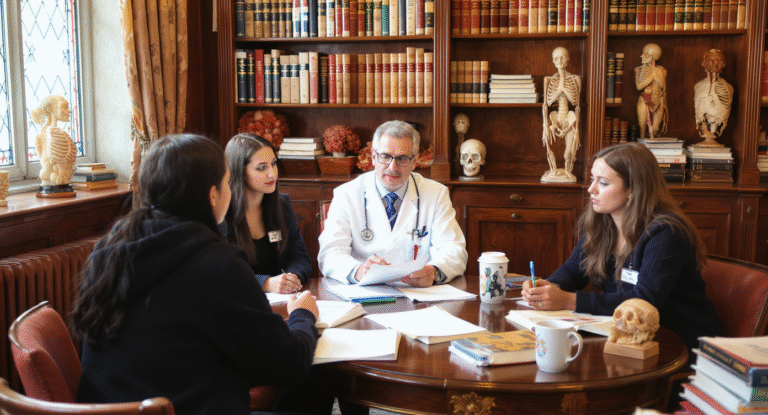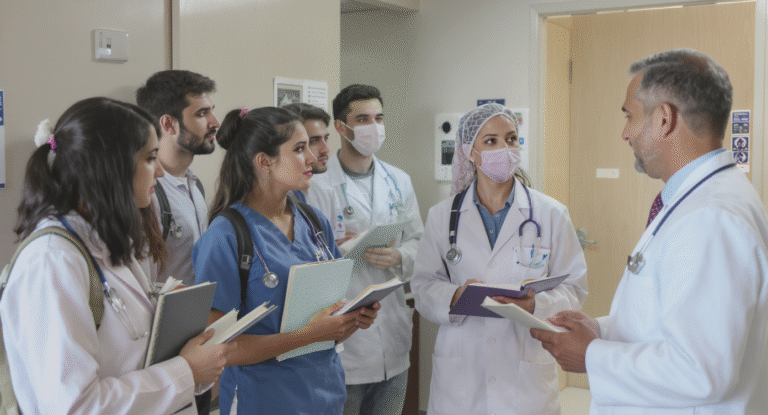
Picture this: you’re 17, clutching your A-level results, heart hammering as you contemplate the next six years of your life. Medicine isn’t just a career choice—it’s a commitment that’ll shape everything from your social life to your sleep schedule (spoiler alert: there won’t be much of either). But here’s the thing about studying medicine in the UK that nobody tells you upfront: where you train matters more than you think.
I’ve watched countless students agonize over medical school applications (more tips on navigating the UK student application process here), and frankly, most guides make it sound like rocket science. It’s not. But it is competitive, expensive, and absolutely crucial to get right the first time. The medical universities in UK aren’t just educational institutions—they’re launching pads for careers that’ll span decades.
Whether you’re dreaming of neurosurgery at Great Ormond Street Hospital or family practice in rural Scotland, your choice of medical school will ripple through your entire professional life. Some schools open doors that others simply can’t. Others offer experiences that’ll fundamentally change how you think about medicine.

The Hierarchy Nobody Talks About (But Everyone Knows)
Let’s cut through the diplomatic language. Not all medical universities are created equal, and pretending otherwise helps nobody.
Oxford and Cambridge sit at the apex, obviously. Oxford maintains its leadership position globally in clinical and health education, while Cambridge consistently ranks in the top tier for medical education. But here’s what’s interesting: their dominance isn’t just about prestige. These institutions produce doctors who think differently. The tutorial system at Oxford, the small-group teaching at Cambridge—these aren’t just educational methods, they’re ways of rewiring how medical minds work.
Then you have what I call the “London Powerhouses.” Imperial College London has quietly become a medical juggernaut. Imperial College London maintains its position among the top medical institutions globally. UCL (University College London) and King’s College London aren’t far behind, each with their own strengths and peculiarities.
But here’s where it gets interesting—and where most guides get it wrong. Aberdeen has been making waves. The Guardian gave the top spot to the University of Aberdeen with a score of 100, marking the second consecutive year it’s held this position. That’s not a fluke. Aberdeen’s been quietly revolutionizing medical education while everyone else was looking south.
| University | Recent Ranking Position | Notable Strength | Application Difficulty |
| Oxford | 1st (Global) | Tutorial system, Research excellence | Extremely High |
| Cambridge | Top 3 (Global) | Scientific foundation, Small groups | Extremely High |
| Imperial College | Top 10 (Global) | Technology integration | Very High |
| Aberdeen | 1st (Guardian UK) | Student satisfaction, Innovation | High |
| Edinburgh | Top 20 (Global) | Historical prestige, Research | Very High |
The UCAT Revolution: Everything Changed in 2024
Here’s something that’ll save you months of confusion: the BMAT is dead. From 2024 onwards, UK medical universities moved entirely to the UCAT (University Clinical Aptitude Test) system. This isn’t just a minor administrative change—it’s fundamentally altered the medical universities landscape.
Previously, if you were gunning for Oxford or Cambridge, you’d spend months preparing for the BMAT alongside your regular studies. Now? Everyone’s playing by the same rules. All UK medical universities now require only the UCAT, since no alternative admissions tests are being used.
What does this mean for you? First, your preparation just got simpler (sort of). You’re focusing on one test instead of potentially juggling multiple admissions exams. Second, the playing field has leveled slightly. Schools that previously relied heavily on BMAT scores are now figuring out how to weight UCAT results alongside everything else.
The reality of UCAT scores: Don’t let anyone tell you the “average” score is what matters. Bristol University, for example, had an interview threshold of 2,940 for 2024 entry, with 100% weighting on UCAT after minimum academic requirements are met. That’s not average—that’s competitive.
Regional Powerhouses You’re Probably Overlooking
Everyone fixates on Oxford, Cambridge, and London. I get it. But some of the most innovative medical education is happening in places you wouldn’t expect.
Scotland’s quiet revolution deserves attention. Edinburgh has always been respected, but Glasgow and Aberdeen are doing genuinely interesting things. Aberdeen’s rise to the top of The Guardian rankings isn’t accidental—they’ve been rethinking medical education from the ground up.
The Northern gems include Manchester and Liverpool, both with massive teaching hospitals and surprisingly strong research profiles. Sheffield has one of the most diverse student bodies in the country. Leeds combines traditional excellence with modern innovation in ways that would surprise you.
Then there are the joint ventures—Brighton and Sussex Medical School, Hull York Medical School, Kent and Medway Medical School. These joint medical universities represent innovative approaches to medical education, combining resources from multiple institutions. They’re smaller, often more experimental, and sometimes produce graduates who think outside traditional medical boxes.
The Money Question Everyone Dances Around
Let’s talk finances, because pretending money doesn’t matter is naive. Medical universities is expensive—not just tuition, but the opportunity cost of six years when you could be earning.
Tuition fees for home students hover around £9,250 per year. That’s £55,500 just for tuition over six years, before you factor in living costs, books, equipment, and the various hidden expenses that medical students face. More information on medical universities funding can often be found from student finance bodies or medical associations.
International students face much steeper costs—often £35,000-45,000 per year. That’s potentially £270,000 for the degree alone. (Learn more about support for international students).
But here’s what admissions offices won’t tell you directly: financial background still matters. Not officially, of course. But students from comfortable backgrounds can afford UCAT preparation courses, multiple application attempts, and don’t need to work part-time during their studies.
This is where organizations like Uni Students Hub become genuinely valuable. Their scholarship and financial aid support isn’t just about finding money—it’s about understanding which schools offer the best financial packages and how to navigate the complex world of medical universities funding. They’ve helped students secure everything from NHS bursaries to private scholarships that most people never hear about.
What They Don’t Tell You About Clinical Placements
Here’s something crucial that gets glossed over in glossy university brochures: your clinical placements will largely determine what kind of doctor you become. And not all clinical placements are created equal.
London schools give you access to world-class hospitals but also throw you into the chaos of urban medicine from day one. You’ll see rare conditions, cutting-edge procedures, and levels of complexity that regional hospitals simply don’t encounter. But you might also feel like a small fish in a very large pond.
Regional schools often provide more hands-on experience earlier. In smaller hospitals, medical students get more responsibility, more direct teaching, and better relationships with consultants. The flip side? You might graduate having never seen certain rare conditions that London students encounter regularly.
Teaching hospital quality varies dramatically. Some are research powerhouses where you’ll work alongside internationally renowned consultants. Others are excellent district general hospitals where you’ll get practical, bread-and-butter medical experience. Both have value, but they produce different types of doctors.
Here’s my honest take: if you want to be a specialist in a competitive field, London or Oxford/Cambridge gives you advantages. If you want to be an excellent general practitioner or work in less competitive specialties, a good regional school might actually serve you better.

The Application Reality Check
Every year, thousands of students apply to medical universities in UK with completely unrealistic expectations. Let me save you some heartbreak.
Your grades matter, obviously. But AAA is increasingly the baseline, not the goal. Most successful applicants have grades that would get them into almost any other course at any university.
Work experience requirements have become almost absurd. Hospitals are overwhelmed with medical university hopefuls, making meaningful placements increasingly difficult to secure. The key isn’t quantity—it’s quality and reflection. One week in a GP surgery where you genuinely engaged and learned will trump a month of hospital volunteering where you just observed from the sidelines.
Personal statements are where most applications die. Here’s the brutal truth: admissions tutors can spot generic, coached statements from miles away. They don’t want to hear about your “passion for helping people” (everyone says that). They want specific examples of problem-solving, leadership, and genuine insight into what medicine actually involves.
| Application Component | Typical Weight | Reality Check |
| Academic grades | 40-50% | Baseline requirement – won’t get you in alone |
| UCAT score | 30-40% | Can make or break competitive applications |
| Interview performance | 30-35% | Where most offers are won or lost |
| Personal statement | 10-15% | Rarely gets you in, but can definitely keep you out |
| Work experience | Variable | Quality matters more than quantity |
The Interview Minefield
Medical school interviews have evolved into elaborate psychological assessments. MMIs (Multiple Mini Interviews) are now standard at most schools, and they’re designed to catch you off guard.
You’ll face ethical dilemmas with no clear right answers. You will also be asked to explain complex medical concepts to actors playing concerned relatives and you will have practical stations where you might need to demonstrate manual dexterity or spatial reasoning.
The key insight most students miss: these interviews aren’t testing your medical knowledge (you don’t have any yet). They’re testing your ability to think under pressure, communicate clearly, and maintain empathy while dealing with difficult situations.
Beyond Rankings: What Actually Matters
Rankings obsess over research output and global reputation. But as a medical student, you care about different things.
Class sizes vary dramatically. Oxford and Cambridge tutorials might have 2-3 students. Large regional schools might have lecture theaters with 200+ students. Both have advantages—small groups for personalized attention, large cohorts for diverse perspectives and social opportunities.
Student support systems are crucial but rarely discussed. Medical universities are tough—really tough. Depression and anxiety rates among medical students are significantly higher than the general population. Schools with robust mental health support, peer mentoring programs, and genuinely caring pastoral care systems will make your six years more bearable.
Location lifestyle matters more than you think. Edinburgh is beautiful but expensive. Aberdeen is more affordable but can feel isolated. London offers everything but at a price that’ll strain any budget. Manchester gives you city amenities without London costs.
Think about what you need to thrive. Are you someone who needs constant stimulation and activity? London might be perfect. Do you prefer smaller communities where you can form deeper relationships? Consider regional schools.
The International Student Reality
If you’re applying from outside the UK, the landscape looks very different. There are many universities in the UK ranked for medicine, but not all welcome international students equally.
Visa requirements have become increasingly complex. You’ll need not just academic qualifications but demonstrated English proficiency, financial guarantees, and often additional documentation that domestic students never consider.
Cultural adaptation in medical school is particularly challenging. You’re not just learning medicine—you’re learning to practice medicine within the British healthcare system (NHS), with its particular protocols, hierarchies, and patient expectations.
This is where comprehensive support becomes invaluable. Uni Students Hub specializes in end-to-end admissions support that goes beyond just helping with applications. Their pre-departure orientation specifically addresses the challenges international medical students face—from understanding NHS structures to navigating British medical culture. Find out more about us and how we help.
Career Trajectories: Where You Start Shapes Where You End Up
Let’s be honest about something admissions tutors won’t: where you train influences your entire career trajectory.
Oxbridge graduates have networks that open doors throughout their careers. That’s not fair, but it’s reality. They’re overrepresented in academic medicine, hospital leadership, and competitive specialties.
London medical school graduates often find it easier to secure competitive training posts in the capital. Teaching hospitals prefer trainees they know, and familiarity breeds preference.
Regional school graduates often have advantages in local job markets. If you want to practice in Scotland, graduating from a Scottish medical school helps. If you’re aiming for general practice in rural England, a regional school might actually give you better preparation.
The key is aligning your choice with your ultimate career goals. Want to be a research-heavy academic cardiologist? Oxford or Imperial might be worth the extra pressure. Planning to be a dedicated GP in your hometown? Your local medical school might serve you better and cost less.
Making Your Decision: A Framework
Here’s how I recommend approaching your choice of medical universities in UK:
- First, be realistic about your stats. If you don’t have AAA predicted grades and a UCAT score above 2800, Oxford and Cambridge are probably off the table. That’s not failure—it’s strategic thinking.
- Second, consider your learning style. Do you thrive in competitive environments, or do you prefer collaborative settings? Some schools cultivate competition, others emphasize cooperation.
- Third, think long-term. Where do you want to practice? What specialty interests you? How important is research vs. clinical practice in your career vision?
- Fourth, consider financial reality. Can your family support you through six years of study? Do you need to work part-time? Are scholarships available?
- Finally, visit if possible. Medical schools have distinct cultures. What looks perfect on paper might feel wrong in person, and vice versa.
The Application Strategy That Actually Works
Most students approach medical school applications backwards. They choose schools first, then try to craft applications that fit. That’s inefficient and often unsuccessful.
Instead, start with self-knowledge. What are your genuine strengths? Which experiences have genuinely shaped your interest in medicine? Which kind of doctor do you actually want to become?
Then research strategically. Don’t just look at rankings—look at curricula, teaching methods, assessment styles, and graduate outcomes. Some schools use problem-based learning exclusively. Others maintain traditional lecture-based approaches. Some assess continuously, others rely heavily on final exams. Explore various undergraduate courses and postgraduate courses to understand different structures.
Match your profile to school preferences. Some schools prefer well-rounded candidates with diverse interests. Others prefer focused applicants with clear medical commitment. Some value research experience highly, others prioritize clinical exposure.
This matching process is where professional guidance becomes invaluable. Organizations like Uni Students Hub don’t just help with paperwork—they help you understand which schools are genuinely good fits for your profile and goals. Their tailored academic placement services can identify opportunities you’d never find on your own.
The FAQs You’re Actually Wondering About
Can I get into medical universities with AAB instead of AA*A?
Possibly, but you’d need exceptional UCAT scores and compelling extenuating circumstances. Most schools are inflexible on grade requirements.
How important is the UCAT really?
Extremely. With grade inflation, UCAT scores are often the primary differentiator between candidates.
Should I take a gap year if I don’t get in first time?
Often yes. Medical schools actually prefer candidates who’ve used gap years productively to gain more experience and maturity.
Is it easier to get into Scottish medical schools as a Scottish student?
Yes, there are reserved places for Scottish students, but competition is still fierce.
Can I transfer between medical schools?
Rarely. Medical curricula are too different, and schools have no incentive to accept transfers.
The Uncomfortable Truths
Before you commit to this path, understand what you’re signing up for. Medical school isn’t just academically challenging—it’s emotionally and physically grueling. You’ll see suffering, death, and human tragedy regularly. Also you will be making mistakes that might harm patients and work hours that would be illegal in most other professions.
The medical universities in UK are excellent at teaching you medicine. They’re less good at preparing you for the psychological reality of being a doctor. Depression rates among medical students and junior doctors are alarmingly high. Work-life balance is often a myth rather than reality.
I’m not trying to discourage you—medicine can be an incredibly rewarding career. But too many students enter medical school with romanticized notions of what they’re choosing. The reality is harder, messier, and more complex than any university brochure suggests. (For more insights, check out our blog).
Your Next Steps
If you’ve read this far, you’re probably serious about medical school. Here’s your action plan:
- Assess your academic position honestly. If your grades aren’t competitive yet, focus on improving them before anything else.
- Start UCAT preparation early. This isn’t a test you can cram for—it requires months of systematic practice.
- Seek quality work experience. One meaningful placement trumps multiple superficial ones.
- Research schools strategically. Look beyond rankings to find genuine matches for your goals and learning style.
- Consider professional guidance. The stakes are too high and the process too complex to navigate entirely alone.
The path to medical school is challenging, expensive, and intensely competitive. But for those genuinely called to medicine, it remains one of the most rewarding career paths available. Choose your medical university carefully—it’s not just about the next six years, but about the next sixty years of your professional life.
For students seeking comprehensive support through this complex process, Uni Students Hub offers tailored academic placement services, scholarship guidance, and end-to-end admissions support. Located at 107-111 Fleet Street, London EC4A 2AB, they provide the kind of personalized guidance that can make the difference between admission and rejection. You can reach them at +44 7827 224636 to discuss how their expertise might support your medical school ambitions.
The medical universities in UK offer world-class education and the chance to join one of the most respected professions in the world. The question isn’t whether you’re smart enough—if you’re reading this guide, you probably are. The question is whether you’re prepared for the journey ahead and ready to make the strategic choices that will set you up for success.
